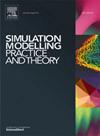An improved parallel scheduling algorithm for periodic directed acyclic graphs
IF 3.5
2区 计算机科学
Q2 COMPUTER SCIENCE, INTERDISCIPLINARY APPLICATIONS
引用次数: 0
Abstract
The periodic directed acyclic graph (DAG) is an important system model widely used to describe the structure and function of time-critical applications. The nodes in periodic DAGs are not only coupled with each other by input-output relations but also connected via the preceding period, making it hard to find an optimal schedule. This paper proposes an improved parallel scheduling algorithm for periodic DAGs (PSA-PDAG), decoupling the dependencies between nodes. In each period, PSA-PDAG computes more nodes in parallel, greatly improving the parallelism during computation. By applying PSA-PDAG, the computation time of each period is only the maximum update time among all nodes, which is superior to existing parallel algorithms. In typical periodic DAG examples, theoretical analysis and experimental results show that PSA-PDAG generally outperforms existing serial and hierarchical scheduling parallel algorithms. For instance, in the hybrid-structure large-scale experiment with 128 DAG nodes, compare with the 2.0x speedup of the hierarchical scheduling parallel algorithm, PSA-PDAG can achieve a considerable 48.6x speedup with 128 cores.
一种改进的周期有向无环图并行调度算法
周期有向无环图(DAG)是一种重要的系统模型,广泛用于描述时间关键应用的结构和功能。周期dag中的节点不仅通过输入输出关系相互耦合,而且还通过前一周期相互连接,很难找到最优调度。提出了一种改进的周期dag并行调度算法(PSA-PDAG),解耦了节点间的依赖关系。在每个周期内,PSA-PDAG并行计算更多的节点,大大提高了计算的并行性。通过应用PSA-PDAG,每个周期的计算时间仅为所有节点之间的最大更新时间,优于现有的并行算法。在典型的周期并行调度实例中,理论分析和实验结果表明,PSA-PDAG总体上优于现有的串行和分层调度并行算法。例如,在128个DAG节点的混合结构大规模实验中,与分层调度并行算法2.0倍的加速相比,128核的PSA-PDAG可以实现48.6倍的可观加速。
本文章由计算机程序翻译,如有差异,请以英文原文为准。
求助全文
约1分钟内获得全文
求助全文
来源期刊

Simulation Modelling Practice and Theory
工程技术-计算机:跨学科应用
CiteScore
9.80
自引率
4.80%
发文量
142
审稿时长
21 days
期刊介绍:
The journal Simulation Modelling Practice and Theory provides a forum for original, high-quality papers dealing with any aspect of systems simulation and modelling.
The journal aims at being a reference and a powerful tool to all those professionally active and/or interested in the methods and applications of simulation. Submitted papers will be peer reviewed and must significantly contribute to modelling and simulation in general or use modelling and simulation in application areas.
Paper submission is solicited on:
• theoretical aspects of modelling and simulation including formal modelling, model-checking, random number generators, sensitivity analysis, variance reduction techniques, experimental design, meta-modelling, methods and algorithms for validation and verification, selection and comparison procedures etc.;
• methodology and application of modelling and simulation in any area, including computer systems, networks, real-time and embedded systems, mobile and intelligent agents, manufacturing and transportation systems, management, engineering, biomedical engineering, economics, ecology and environment, education, transaction handling, etc.;
• simulation languages and environments including those, specific to distributed computing, grid computing, high performance computers or computer networks, etc.;
• distributed and real-time simulation, simulation interoperability;
• tools for high performance computing simulation, including dedicated architectures and parallel computing.
 求助内容:
求助内容: 应助结果提醒方式:
应助结果提醒方式:


